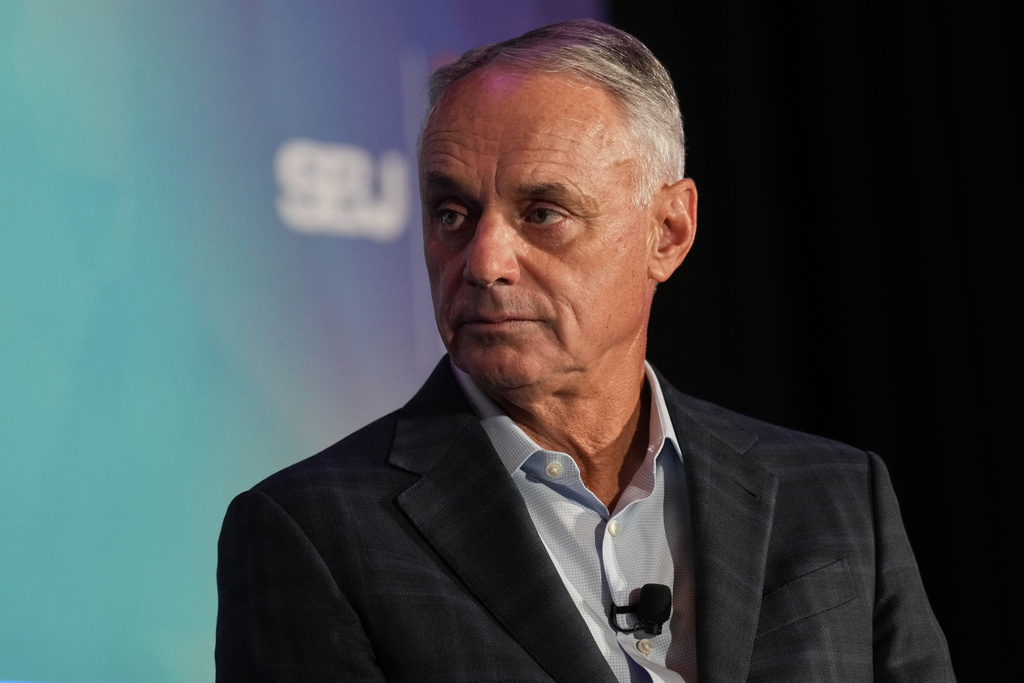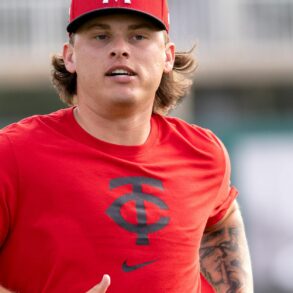
There is no shortage of talking points surrounding Major League Baseball.
Amid the interest around ESPN’s expiring TV deal; a collective bargaining agreement (CBA) that ends in 2026; and the potential implementation of the ABS challenge system; the MLB owners convened in New York City this week for their annual in-season meeting.
MLB Commissioner Rob Manfred discussed those hot-button topics, among others, during a press conference Wednesday afternoon.
Here are the biggest takeaways:
ROSE REINSTATEMENT
Manfred’s decision last month to remove Pete Rose and other deceased former players from MLB’s permanently ineligible list received “mixed” reviews, the commissioner said.
Rose, who died in September at age 83, was banned in 1989 after an MLB investigation found that he bet on the Cincinnati Reds to win while he was the team’s manager. In a letter to Rose’s attorney, Manfred deemed that a person “cannot represent a threat to the integrity of the game” after their death.
President Trump was among those who had advocated for Rose to be reinstated. Manfred met with Trump at the White House in April.
“The President was one of a number of voices that was supportive of the idea that this was the right decision,” Manfred said Wednesday. “Obviously, I have respect for the office, and the advice that he gave I paid attention to, but I had a lot of other people who were weighing in on the topic as well.”
The National Baseball Hall of Fame has said the decision makes Rose eligible for induction.
ESPN EXPIRATION
Manfred hopes to have MLB’s fast-approaching national TV vacancy resolved by next month’s All-Star Game.
ESPN, which broadcasts “Sunday Night Baseball,” opted out of the final three years of its contract and plans to conclude its coverage after this season.
Manfred acknowledged Wednesday that MLB is in discussion with three potential partners but declined to name them. NBC and Apple TV+ have been reported as contenders.
“Each set of conversations involves a different group of content,” Manfred said. “They’re not the same. It’s not like it’s one package that we’re talking to three people about. We’re talking to three people about different packages.”
MLB is targeting a three-year contract through 2028 to replace ESPN’s original deal, which was for about $550 million annually. That would line up with MLB’s other national rights contracts, which expire in 2028.
Asked if MLB would prioritize dollars or audience reach from a new partner, Manfred said, “Given that we see the ESPN part of it — what used to be the ESPN part of it — as kind of a bridge to 2028, I would overweight reach on that package. But it’s still a balance.”
ABS LATEST
For many, MLB’s experiment with the Automated Ball-Strike (ABS) challenge system was a home run.
MLB tested the system, which allows players to challenge a ball or a strike call twice per game, during spring training, and it could be instituted for real games as soon as 2026.
“I think the teams are really positive about ABS. I do have that unscientific system that I use: my email tracking,” Manfred said.
“My distinct impression is that using ABS in spring training has made people more prone to complain about balls and strike calls via email to me, referencing the need for ABS. That is undoubtedly true.”
ABS still needs to go through a joint committee process before it becomes an official rule.
Even with baseball’s CBA set to end after the 2026 season, Manfred said he is open to making the change before next season – ahead of bargaining.
“We bargained for the right to make these kinds of rule changes. It was a really important part of the deal from our perspective,” Manfred said.
“Everybody understood what the rules of the road were, and unlike the prior provision, there’s actually a process that is involved that you go through, that you have a chance to vet and talk about what should happen with the players. So I’m less reticent about that.”
CAP CONUNDRUM
Manfred was asked Wednesday what the timeframe would be for determining MLB’s position on a salary-cap proposal.
The commissioner pointed to the offseason in the context of determining all proposals.
“We would ordinarily go to the table at the beginning of our season — March, April, whatever — so obviously over the winter, we’re going to have to decide about what is gonna be out there from our perspective,” Manfred said. “But no decisions on that topic so far.”
At the owners’ meetings in February, Manfred said fans have expressed concerns about a lack of salary cap. Multiple owners have advocated for a salary cap or at least expressed dissatisfaction with baseball’s payroll disparity.
The Los Angeles Dodgers’ $408.7 million payroll, when including the competitive balance tax, is an MLB record — and nearly five times larger than the Athletics’ MLB-low $83.0 million, according to Cot’s Contracts.
“Payroll disparity is such a fact of life among the ownership group that there’s not a lot of need for talking about whether we have it or not,” Manfred said Wednesday. “Everybody kind of gets it. We understand that has become a bigger problem for us, but there has not been a lot of conversation about that particular topic.”
STADIUM SAGA
There is optimism the Tampa Bay Rays will be able to return to Tropicana Field next season.
The Rays are using George M. Steinbrenner Field — the Yankees’ spring-training home — in 2025 after Hurricane Milton caused significant damage to the Trop.
“The repair of the stadium’s moving along,” Manfred said. “We remain optimistic that we will be ready for Opening Day or very shortly thereafter. Obviously, the big contingency is what happens with hurricane season. There’s not much you can do about that other than keep your fingers crossed.”
The A’s, meanwhile, remain confident they will be able to move to Las Vegas for the 2028 season, Manfred said.
GAME GROWTH
MLB is on track for its third consecutive season of increased attendance, with numbers up by 1.6% to this point.
ESPN’s MLB viewership is up by 22% compared to last year, while Fox’s is up by 10%. Viewership in Japan is averaging 2.7 million viewers, despite the time difference.
Factors for that growth, according to Manfred, include the star power of players such as the Yankees’ Aaron Judge and Dodgers’ Shohei Ohtani; a youth movement that includes the Kansas City Royals’ Bobby Witt Jr.; a balanced schedule that allows for more premier interleague matchups; and the benefit of having contending teams in New York, Los Angeles and Chicago.
“The product that we’re putting on the field is a better product than it was five years ago,” Manfred said.
Originally Published:
This post was originally published on this site be sure to check out more of their content.






